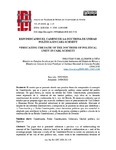Reivindicando el camino de la doctrina de unidad política en Carl Schmitt

Use this link to cite
http://hdl.handle.net/2183/27830
Except where otherwise noted, this item's license is described as Atribución-CompartirIgual 4.0 Internacional (CC BY-SA 4.0)
Collections
Metadata
Show full item recordTitle
Reivindicando el camino de la doctrina de unidad política en Carl SchmittAlternative Title(s)
Vindicating the Path of the Doctrine of Political Unity in Carl SchmittAuthor(s)
Date
2021-02-04Citation
Aldrete Acuña, C. Y. (2021). Reivindicando el camino de la doctrina de unidad política en Carl Schmitt. Anuario da Facultade de Dereito da Universidade da Coruña, 24, 1-38. https://doi.org/10.17979/afdudc.2020.24.0.7453
Abstract
[Resumen] El escrito que se presenta aborda una peculiar forma de comprender el concepto de Constitución, que es a partir de su configuración política como unidad del pueblo soberano. De igual forma, se realiza un estudio del Poder Constituyente, precisamente, como expresión de la voluntad de esa unidad política, cuya obra es la decisión constitucional de unidad y ordenación de la vida del Estado. Es necesario adelantar que el estudio que se propone sigue una marcada tendencia hacia el pensamiento de Carl Schmitt y Hermann Heller. En prioridad estructural el del primeramente señalado. Mediante el empleo de los métodos constructivista y comparativo, se plasman las ideas que identifican a la Constitución y al Poder Constituyente, como decisiones políticas que una sociedad ha adoptado para establecer la forma y el modo de su propia existencia política a través de la construcción de un Estado Constitucional y Democrático de Derecho. [Abstract] The paper that is presented addresses a peculiar way of understanding the concept of the Constitution, which is based on its political configuration as a unit of the sovereign people. Likewise, a study of the Constituent Power is carried out precisely as an expression of the will of that political unit, whose work is the constitutional decision of unity and organization of the life of the State. It is necessary to anticipate that the proposed study follows a marked trend towards the thought of Carl Schmitt and Hermann Heller. In structural priority, that of the first mentioned. Through the use of the constructivist and comparative methods, the ideas that identify the Constitution and the Constituent Power are embodied, as political decisions that a society has adopted to establish the form and mode of its own political existence through the construction of a Constitutional and Democratic State of Law.
Keywords
Constitución
Poder constituyente
Soberanía
Unidad política
Lex superior
Constitution
Constituent power
Sovereignty
Political unity
Supreme law
Poder constituyente
Soberanía
Unidad política
Lex superior
Constitution
Constituent power
Sovereignty
Political unity
Supreme law
Editor version
Rights
Atribución-CompartirIgual 4.0 Internacional (CC BY-SA 4.0)
ISSN
2530-6324
1138-039X
1138-039X






